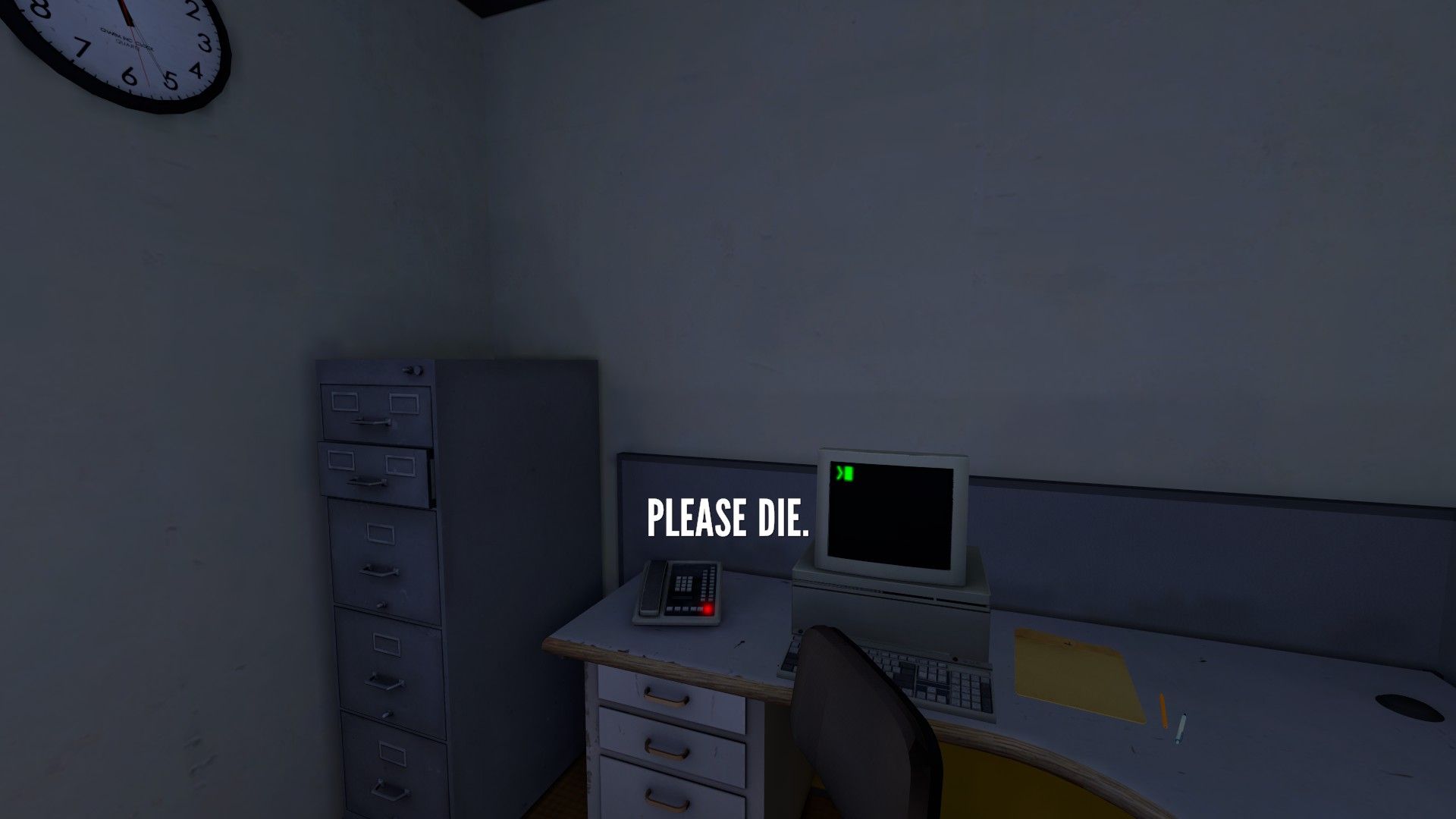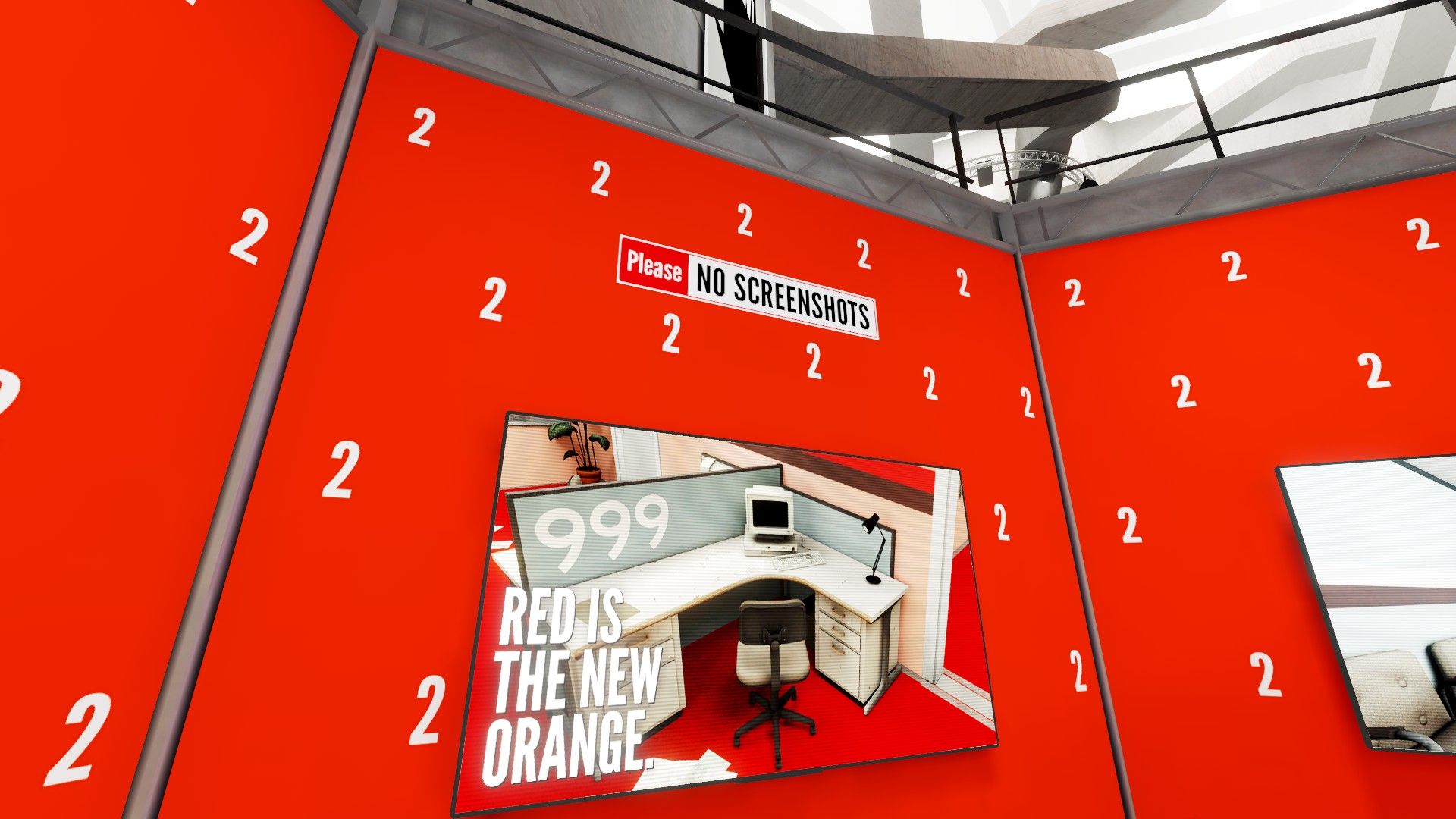What is The Stanley Parable?
Exploring the bizarre - and hilarious - meta commentary experience


What is The Stanley Parable? The official website for the classic indie PC title cleverly answers this question by stating the following:
“…You will play as Stanley, and you will not play as Stanley. You will make a choice, and you will have your choices taken from you. The game will end, the game will never end. Contradiction follows contradiction, the rules of how games should work are broken, then broken again. You are not here to win. The Stanley Parable is a game that plays you.”
This is an adequate and fair representation of what playing The Stanley Parable is like; it is bereft of specificity and leaves the audience pondering what an experience like this would be like. At a deeper level, this description fails to capture the emotional nuances that The Stanley Parable uses to capture its players. While revisiting the lionized 2013 title via its re-release The Stanley Parable: Ultra Deluxe, I found myself thinking about the nature of the adventure game over and over again while trekking and re-trekking through its postmodern office labyrinth.
Fundamentally, The Stanley Parable is indeed a parable. This should let us know that through Stanley, the player should be able to ascertain and take away a moral or spiritual lesson. However, The Stanley Parable operates in so many coded layers that perhaps the lessons are weaved into a thicket of indiscernible passages.
What is The Stanley Parable? My goal is to answer and articulate exactly what this game is and what makes it such a unique and powerful experience.

Setting and theme
The top level of The Stanley Parable is its immediate setting and theme. So let’s talk about Stanley, a low ladder employee of some large corporation who has a desk job that involves nothing more but following specific instructions laid out for him, and he loves it. The presentation of Stanley’s character leads the player into buying this as sarcasm; the narrator wants the player to know that this is standard office worker hell. As Stanley proceeds to investigate the mystery surrounding the disappearances of his co-workers, he is met with an office that is laid out in the form of a labyrinth decorated with standard office supplies. The décor in this setting is eerie (and if it doesn't seem this way initially, multiple play throughs will confirm the sensation). The constant repetition of the narrator starts to echo in the empty halls and you feel more and more alone in the environment. It's an excellent touch of existential horror added to a locale that is typically devoid of such horror. The idea is compounded as you reach locations like the break room or the boss’s office where graffiti and power point slides contain deadpan commentary on the woes of corporate life. Until the player gets to the ending their first time they might truly believe that The Stanley Parable is nothing more than a jab at big corporations and work horse jobs, and that they can expect even more of this in the future from the game. Fortunately, the introspective player will be pleased to know that the story of Stanley the tragically content office worker is only a pseudo-narrative the author uses to convey their more topical commentary on the human condition.

Decisions, decisions
As an experience I’ve thought about The Stanley Parable as many things. It is often labelled as an adventure game, which is true: you experience Stanley’s adventure. Beyond this it is often seen as a choice-based game, and is even marked on Steam with the “choices matter” tag. Although I would argue against this; the player's choices rarely feel like they have weight, and that’s on purpose. Previously, I stated that the game cast Stanley as a man that loves his job and carries out instructions happily. The first easily recognizable decision comes in the form of two hallways. The narrator says that Stanley knows that the meeting room is to the left but makes no mention of the right. It would be fairly easy to find out that the game is tempting you to disobey here (although you know that Stanley is a person that would listen to the narrator). There is nothing visibly different about these two options so other than knowing exactly where you are supposed to go to succeed; this option in no way telegraphs that anything may happen to you if you lead Stanley down the right hallway.
This shines a light on the weight of the choice: what would going down the right hallway entail?
All that the player knows now is that this decision would involve disobeying the narrator, who they likely know is trying to lead them down the path to the freedom ending. The narrator breaks character as soon as you disobey him which is initially hilarious, but the more you do it the harder the game cranks into an ending of your run where the narrator intentionally antagonizes your decisions (as seen in the apartment ending), or pleads with you to just sit with him to stop the world from resetting (as seen in the space ending).
But lets remind ourselves that this is a parable, you are learning something, but what’s the lesson?
The level design and narrative structure beg the player to not follow directions and then punish you with a dialog on the futility of fighting the developer, a curtain pull on the illusion of choice, or a narrative yank into the twilight zone. I don’t know what the developer wants me to understand here; maybe it's the fact that as a player I was motivated to go against the wishes of the narrator. Even though each ending other than the intended one was tragic in nature, I kept exercising my ability to explore and disobey to my hearts content.

Ultra and deluxe
In The Stanley Parable: Ultra Deluxe, the path to the new content started with having Stanley navigate through the reviews of the initial release of The Stanley Parable and then the development museum where all new features in the game were showcased before being implemented into the main game.
The new levels are a commentary on the state of video game production, and how a game is critiqued after launch. This new parable seems easy to grasp; the ravenous consumer seeks to control the creative process of the developer, leading them to make a game that adds 'quality of life' but ultimately detracts from the player experience in the end. Honestly, I think the execution could have been a little more elegant - but this new approach further contextualises the original 2013 release. Importantly, the narrator admits that the original game was not meant to be a comedy per se; rather, it attempted to use comedy as a vehicle to deliver a commentary on the human condition. In the end, that might be a distinction without a difference.
As you move deeper into the experience, The Stanley Parable: Ultra Deluxe introduces concepts that make it more of a "traditional" game by deliberately shoehorning in things like collectibles and hidden achievements (I'm also very happy to report that an exhibit featuring an infinite hole is present, and I strongly recommend any curious players check it out). This section of the game is clearly a parody of modern game design. I won't talk about the rest of the game in detail from here though; I sincerely believe that it is best if you experience it yourself to fully understand and appreciate the scope of the Ultra Deluxe content.

So, let's return to the original question: what is The Stanley Parable?
The early game would have us believe that our everyday work lives are enslaving us, and shedding this part of our lives would be an emancipation of sorts. The rest of the game proposes that deviations from the obvious/most apparent course are worth exploring, even if the consequences might be undesirable.
Ultra Deluxe posits that you should stay true to yourself regardless what others may think, and that perhaps seeking affirmation for every choice could be a hindrance rather than a help.
This experience is about you. Your innate curiosity drives everything about your journey here. While you are just technically moving from attraction to attraction, you still feel as though every step you take has a meaningful narrative impact. The Stanley Parable is the definitive interactive commentary on freedom.
